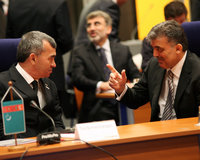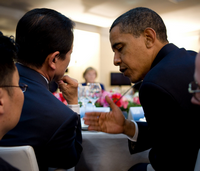Russia Archive
Free Newsletter
Vice President Joseph Biden’s sharply worded criticism of Russia in his interview with The Wall Street Journal, Saturday, came two days after a group of prominent East Europeans published an open letter to the Obama administration urging Washington not to improve relations with the Russian leadership at the expense of its ties with Eastern Europe. The letter was signed by former Czech Republic President Vaclav Havel, founder of Poland’s Solidarity movement and former President Lech Walesa, and ex-President Emil Constantinescu of Romania, along with other intellectuals and former leaders. It confessed to “a nervousness in our capitals” over the thaw […]
An infamous name returned to the British headlines last week when a memoir written by Anthony Blunt, a wartime spy for the Soviet Union, was made public by the British Library. Blunt was the fourth figure in a spy ring that included Guy Burgess, Donald Maclean, and H.A.R. (Kim) Philby, formed while they were at England’s Cambridge University. As a member of MI5, Britain’s domestic intelligence organization, Blunt was well-placed to pass on valuable information to the Russians. Burgess and Maclean were diplomats, and Philby an intelligence officer in MI6, the British equivalent of the CIA. The last three had […]
Vice President Joe Biden’s comments on Russia represent a clear-eyed take on Russia’s fundamental long-term vulnerabilities. Coming from a think tank Russia analyst, they would be noticed mainly for being accurate, if not very remarkable or original. Coming from the U.S. vice president, and in the midst of the U.S.-Russia reset, the reaction is a bit more prickly, from commentators both Russian and Stateside. I suspect that the online excerpts are a bit more provocative than the remarks taken as a whole are, although I don’t have the print edition to know for sure. Setting aside the questions of protocol […]
James Joyner’s got a provocative piece at the National Interest arguing that so far, President Barack Obama’s foreign policy reflects continuity with George W. Bush’s so-called “third term” (i.e., 2006-2008): There are strong signals that a real break will come on some secondaryissues. Obama is much less enthusiastic about missile defense, morelikely to show tough love to Israel and less apt to fervently pursueour half-century-old idiocy in Cuba. But on all the major issues, themovement has been cosmetic. Now, I’d argue that some of the secondary issues are not so secondary (Israel, for instance). I’d also argue that some of […]

Since taking office in May 2008, Russian President Dmitry Medvedev has made improving ties among the former Soviet republics that form the Commonwealth of Independent States (CIS) a foreign policy priority. Nonetheless, recent weeks have yielded further signs of Moscow’s flailing leadership within the group. Only five of the 10 heads of state, invited personally by Medvedev, participated in the latest annual informal CIS summit, held on July 18. The centerpiece of the event, as in past years, was attendance at the annual President’s Cup horse race at Moscow’s Central Hippodrome. Humorists blamed the large number of no-shows on Medvedev’s […]

The Nabucco project gained some momentum in mid-July with the signing of an inter-governmental agreement between countries involved in the natural gas pipeline proposal. If completed, the pipeline would unlock reserves from the Caspian region and potentially the Middle East, thus providing the European gas market with sources of supply outside of Russia. The purpose of the agreement, signed by representatives of the European Commission, Austria, Bulgaria, Romania and Turkey, was to outline a legal framework for transiting gas through the system, and to address other issues such as tariff levels and access to the pipeline network. The signing was […]
It’s pretty tough to argue with conventional wisdom, but Richard Weitz does a good job of it in his WPR column today when it comes to the G-8. Weitz points out that the arguments for enlarging the G-8 to a G-14 or a G-20 are mainly based on economic and demographic shifts. That overlooks the significant security component to the G-8 format, an area in which the eight member nations do, in fact, represent the principle global leaders. I wish I’d had Richard’s column to rely on last Friday, during the France 24 program, The World This Week, because I […]

Critics of the Group of Eight (G-8) tend to focus on economic issues in challenging the format’s continued relevance. Citing the decreasing share of the economic resources and clout at the group’s disposal, commentators often advocate replacing it with a G-14, a G-20, or some other, more inclusive body. Such a focus, however, neglects another important aspect of the work conducted by the G-8: Since the 1980s, the group’s annual meetings have given rise to important international security initiatives, which have been sustained and further developed over time. The G-8 structure has also proven sufficiently flexible to incorporate additional partners […]
World Politics Review managing editor Judah Grunstein appeared on France 24’s panel discussion program, The World This Week, on Friday to discuss the riots in Xinjiang, the G-8 summit and Obama’s visit to Kenya, along with Anthony Bellanger of Courrier International, Billie O’Kadameri of Radio France International, and Elie Masbounji of l’Orient le Jour. Part One can be seen here. Part Two can be seen here.
In the end, the Italians’ legendary talent for snatching success out of impending disaster won the day, and the G-8 summit in the quake stricken town of l’Aquila this week was “a tour de force of last-minute organization,” as the New York Times called it. There was no major breakthrough on any of the main problems confronting world leaders. But there was a useful clearing of the air on such issues as global warming, as well as a burst of generosity by “have” nations towards struggling economies in the developing world and welcome help for agricultural development. Above all, the […]
I mentioned yesterday that President Barack Obama explained the START follow-on agreement in terms of shoring up the credibility of the NPT. That suggests to me that the arms treaty is not a a bargaining chip to get Russia on board for a tougher stance on Iran, but rather a way to address Iran’s accusations that the U.S. applies the obligations of the NPT selectively. On the other hand, I just noticed that in his speech yesterday, Obama directly linked the logic of European-based missile defense with Russia’s willingness to apply meaningful pressure on Iran. That’s as close as anything […]

SOFIA, Bulgaria — On July 5, Bulgarians voted in legislative elections that seated 240 members of Parliament for the next four years. Although the campaign generated little excitement in this country of 7.2 million inhabitants, the election’s outcome could have a significant impact on an energy tug of war between Europe and Russia. As was widely expected, center-right Citizens for European Development of Bulgaria (GERB), led by Sofia’s Mayor Boiko Borisov, defeated Prime Minister Sergei Stanishev’s Bulgarian Socialist Party (BSP). GERB took 40 percent of the vote, while the BSP-led Coalition for Bulgaria came in second with 18 percent, followed […]
There’s a very strong case to be made for tempering expectations regarding U.S.-Russia relations. Nikolas Gvosdev, in particular, dials in on the key faultline, which has to do with Iran and energy. But the energy in question is gas, not nuclear. Which is why this, from Christian Brose, on the agreement to agree on a START follow-on agreement, misses the point: Obama has just invested a lot of time and effort to secure an agreement to reduce U.S. and Russian nuclear stockpiles to a level that could still annihilate the world several times over. This may be an achievable goal, […]

For a fleeting moment in early June, it looked as though Russia’s 16 years of World Trade Organization (WTO) negotiations were nearing a successful conclusion. After talks on the sidelines of the St. Petersburg Economic Forum, EU Trade Commissioner Catherine Ashton told forum attendants that the country’s WTO accession should be completed by the end of the year. Russia’s chief WTO negotiator Maxim Medvedkov echoed her optimism, saying this was “a good window of opportunity” to join the organization. In the days that followed, some experts began looking forward to the nullification of the Jackson-Vanik Amendment with respect to Russia. […]
